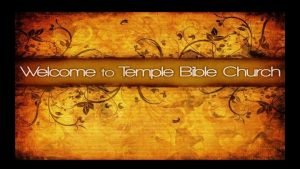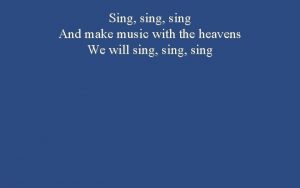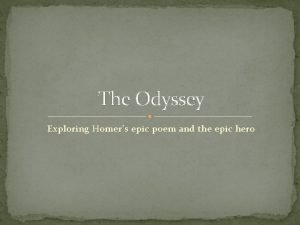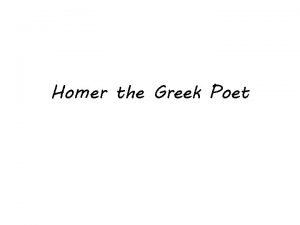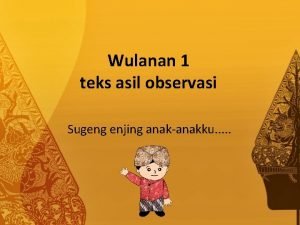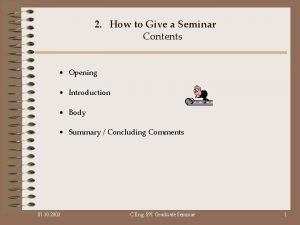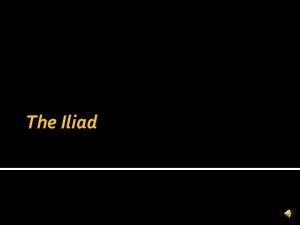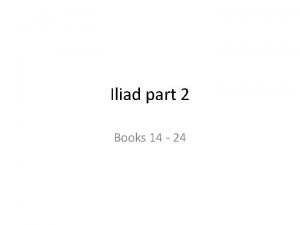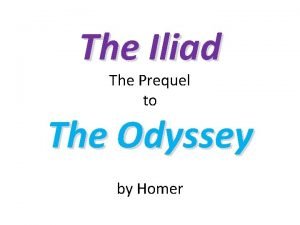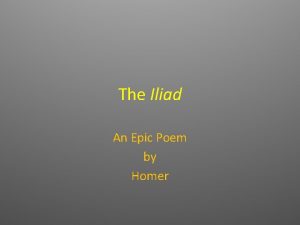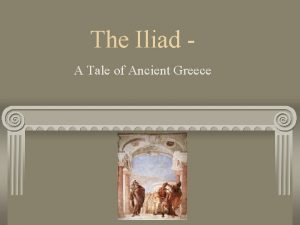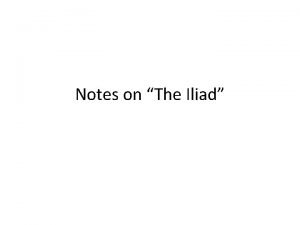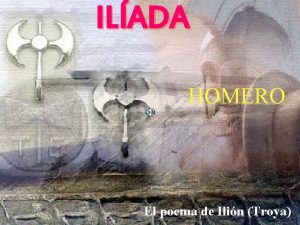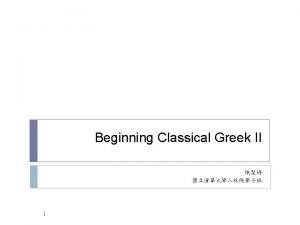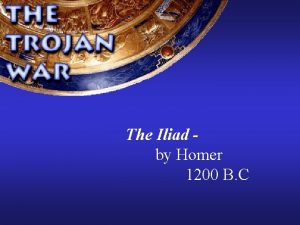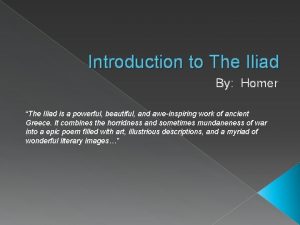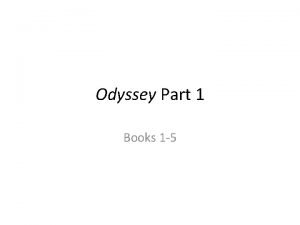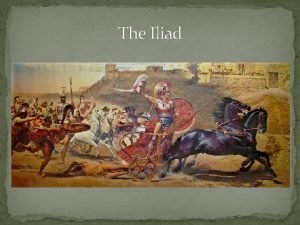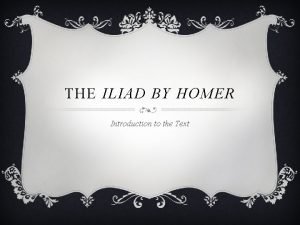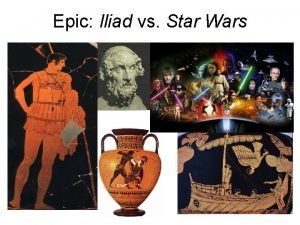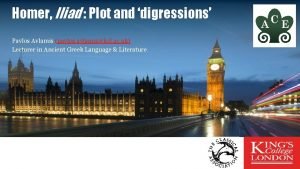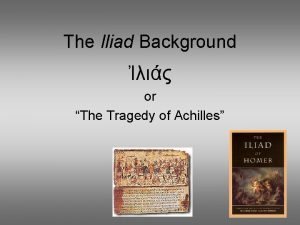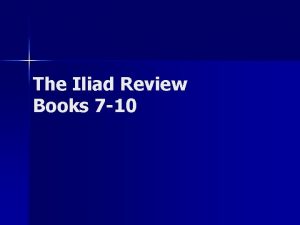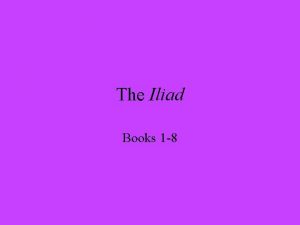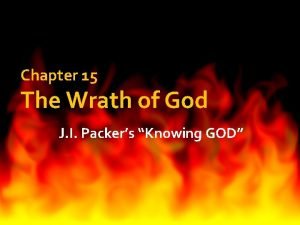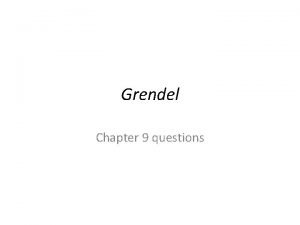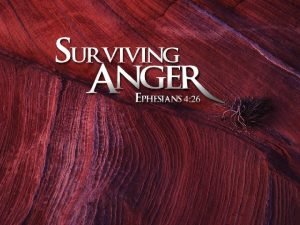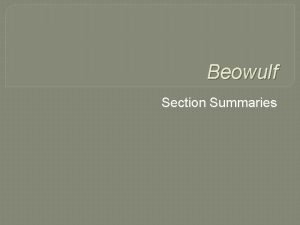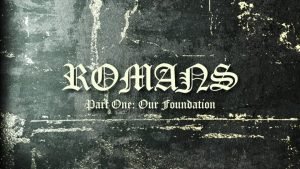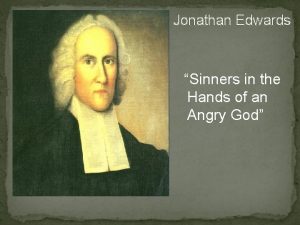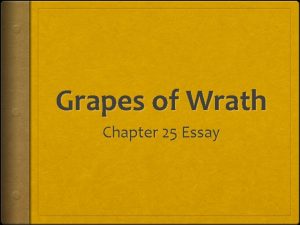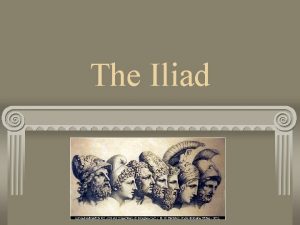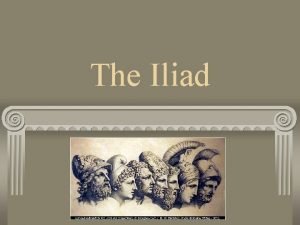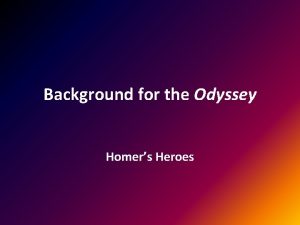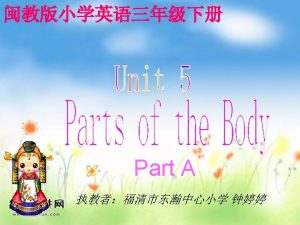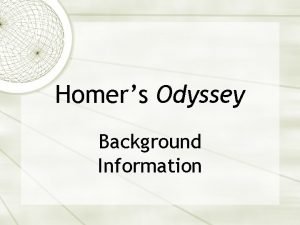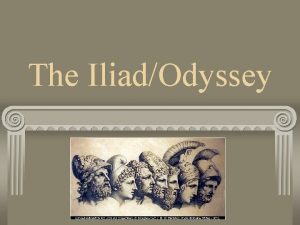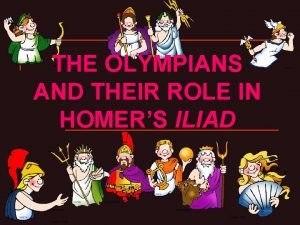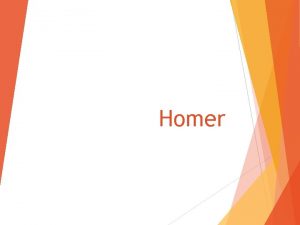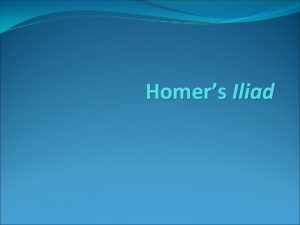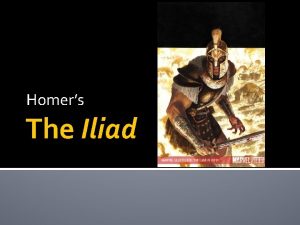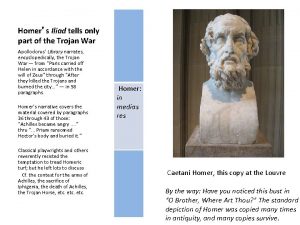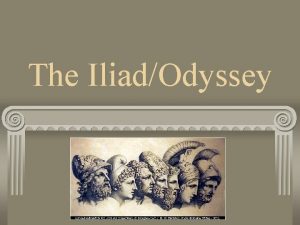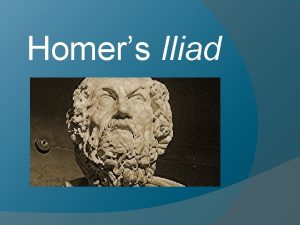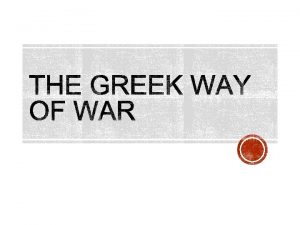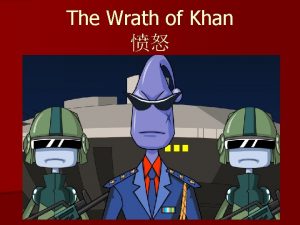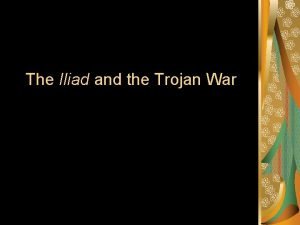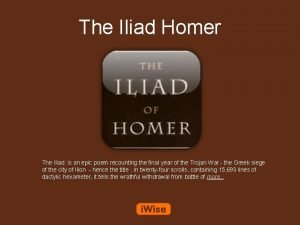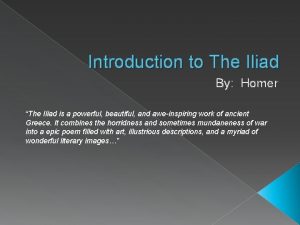Opening lines of Homers Iliad The wrath sing










































- Slides: 42


Opening lines of Homer’s Iliad • The wrath sing, goddess, of Peleus' son, Achilles, that destructive wrath which brought countless woes upon the Achaeans, and sent forth to Hades many valiant souls of heroes, and made themselves spoil for dogs and every bird; thus the plan of Zeus came to fulfillment, [5] from the time when 1 first they parted in strife Atreus' son, king of men, and brilliant Achilles. Who then of the gods was it that brought these two together to contend? • μῆνιν ἄειδε θεὰ Πηληϊάδεω Ἀχιλῆος οὐλομένην, ἣ μυρί᾽ Ἀχαιοῖς ἄλγε᾽ ἔθηκε, πολλὰς δ᾽ ἰφθίμους ψυχὰς Ἄϊδι προΐαψεν ἡρώων, αὐτοὺς δὲ ἑλώρια τεῦχε κύνεσσιν 5οἰωνοῖσί τε πᾶσι, Διὸς δ᾽ ἐτελείετο βουλή, ἐξ οὗ δὴ τὰ πρῶτα διαστήτην ἐρίσαντε Ἀτρεΐδης τε ἄναξ ἀνδρῶν καὶ δῖος Ἀχιλλεύς. τίς τ᾽ ἄρ σφωε θεῶν ἔριδι ξυνέηκε μάχεσθαι;

Ancient Greek Cities

Miletus

Milesian or Ionian School • Thales circa 624 -546 BC – “All things come from water and into water all things are resolved” – Nietzsche claimed that he deserved to be considered the first philosopher because he argued : • A. about the origin of things • B. without image or story • C. claimed that all things are unified • Anaximander 610 -546 BC • Anaximenes 585 -528 BC

Anaximander • All things are apeiron (without border, either internal or external) • From Anaximander we have the earliest words from a philosopher’s own writing: – Whence things have their origin, Thence also their destruction happens, According to necessity; For they give to each other justice and recompense For their injustice In conformity with the ordinance of Time.

Anaximenes • All is aer (spirit or mist)

Pythagoras (570 -495 BC) and the Pythagoreans • Studied Mathematics (Pythagorean Theorem) • Made discoveries about music (sympathy of the strings, musical theory proving that there are hidden mathematical relations governing harmony) • Political Theory: A Pythagorean was asked how one could give one’s son the best possible education, to which he replied that one should make him a citizen of a state with good laws (cited in Hegel) • Something of a mystery cult, with special rituals, diet (no beans) and claiming to have access to hidden knowledge

Pythagorean Table of Opposites • • • Limit Odd One Right Male Rest Straight Light Square Good The Unlimited Even Many Left Female Motion Curved Dark Oblong Evil

Heraclitus 535 -475 BC • “It is wise to listen, not to me, but to the word (logos) and admit that all things are one” • “One cannot put one’s feet into the same river twice for new waters are ever flowing over them” • “By changing it rests” • “Nature hides itself”

The Eleatic School • Xenophanes 570 -475 BC – Against anthropomorphisms • Parmenides fl. Fifth Century BC – Thinking and Being are the same – One cannot think not-Being • Zeno of Elea 490 -430 Bc – Paradoxes


Empedocles 490 -430 BC • Four Classical Elements: Fire, Earth, Air, Water • Bound together by Love, kept apart by Strife • Claimed to remember past lives

Anaxagoras 500 -428 • A philosopher of Athens • Things are made up of seeds, the character of things is determined by these seeds • Like and unlike are separated through the agency of nous (mind) • A friend of Pericles, but after Pericles death he was accused of heresy for claiming that the sun and stars were a flaming rocks and that we don’t feel the heat of the stars because they are at a great distance from the earth

Atomists • Leucippus – Claimed by some to be the founder of Atomism, but so little is known of him that some claim that he never really existed, he was reputed, however, to be the teacher of • Democritus 460 -370 BC – The universe is made of indivisible particles: atoms – The universe is entirely governed by physical laws – One should thus be hedonistic (devote oneself entirely to pleasure)—hence he is called the ‘laughing philosopher’


Sophists (Wise Men) • Main opponents of Socrates in Plato’s dialogues (Hippias, Gorgias, Protagoras, etc. ) • Teachers of rhetoric, to make the weaker side appear the stronger • Protagoras of Abdera the most prominent Sophist 490 -420 BC – “Man is the measure of things” • Relativism? Does this mean that each person can judge the truth of a proposition and there is no basis besides opinion for determining the truth? • Idealism? Does it mean that we cannot talk about a reality which exists outside of human existence?

Socrates 469 -399 BC • Poor (taught for free) • Ugly (in a culture that highly prized physical beauty) • Four sources for his life and philosophy: Xenophon (Conversations with Socrates); Plato (Dialogues); Aristophanes (The Clouds); Aristotle (various references in his philosophical works) • Irony: originally referred to lying, only after Socrates did it come to have the meaning that it has today

Socrates • Taught in the Agora (marketplace) • Taught the aristocratic youths of Athens including Plato and Alcibiades • Claimed to consult his daimon when he needed the answer to some question • Was put on trial for introducing new gods and corrupting the young

Dialectics • According to Aristotle, Zeno of Elea was the first dialectician (reductio ad absurdum) • Socratic Dialectics: In the course of a dialogue the truth will come out. Two opposed points of view can be synthesized, retaining the positive element, the truth, of each proposition. • Historical Dialectics: A society carries within it the seeds of its own destruction. As a society grows this element will tend to take over and destroy other elements. When a new society arises it will contain the positive elements of previous societies.

Plato’s Cratylus (modified for simplicity) Hermogenes Cratylus • Any word can serve to name a thing • Reason: Different languages have different names for things • Socrates’ reductio ad absurdum: There can be no such thing as a private language • There are natural names for things • Reason: When we look at our language we can see that names have natural meanings, a handsaw is a saw which we can use with our hand • Socrates reductio ad absurdum: A jews harp is neither a harp nor does it have anything to do with Jews

Socrates’ Synthesis Language is neither entirely arbitrary nor are there ‘natural names’ for things. Languages follow a ‘natural pattern’ but this pattern is different for each language. Both Hermogenes and Cratylus are both right and wrong

Plato 429 -348 B. C. • Influenced by Heraclitus, the Eleatics, the Pythagoreans (Timaeus is said to be a veiled reference to their ideas), Sophists, and Socrates (Nietzsche called Plato a Mischcharakter, a crossbreed) • Founder of the Academy of Athens, where mathematics, not philosophy, was the main subject • Wrote in dialog form; Socrates was usually the main speaker in the dialogs

Meno, or On Virtue • A slave boy is given a complicated geometrical problem to solve, and is able to do it even without having had instruction in the subject, because certain ideas are innate • Virtue cannot be taught, it must be innate to us

Symposium • A drinking party where the questions of beauty and love are discussed • In the early speeches love is praised and good and bad kinds of love (i. e. lust) are described. • Aristophanes (a famous comic playwrite) describes man as having been split in two and that now each side seeks its other half • At the end of the dialog Alcibiades, a good looking young man (who would later betray Athens), arrives drunk and complains that Socrates never used to pay attention to him although they were lovers

Socrates’ Speech in the Symposium • Love is neither beautiful nor ugly, but seeks beauty • In seeking beauty one is actually seeking immortality – Beautiful bodies give us healthy children who will honor us – Beautiful minds (Homer) give us works which will be honored long after we are dead – Beautiful souls (Solon) will create works which we will admire still more and still longer • Love takes us out of ourselves and unites us with our object, whether a beautiful body, knowledge, or the gods

Gorgias, On Rhetoric • Gorgias argues that rhetoric, the art of persuasion is the highest art • Socrates: the rhetorician is like a cook who prepares a meal that everyone will enjoy, while the philosopher is like a doctor who must sometimes give his patients unpleasant medicine to make them better • Pursuit of pleasure is not the highest good • The tyrant who can do whatever he wants is neither happy nor truly powerful (a theme which will be taken up again in The Republic) • In the afterlife we will all have to be judged naked

The Republic • The longest and most influential of Plato’s dialogs • The dialogue opens with a discussion of old age, but then the question is raised: What is true justice? • A series of attempts to answer this question is given, Thrasymachus (a Sophist) argues that whatever the tyrant demands is just (justice is the interest of the strongest). The rest of the dialog can be read as an attempt to refute this suggestion.

Classes in the Republic • Craftsmen • Auxiliaries • Guardians, ruled over by one of their own, a philosopher king

The Banning of the Poet • A ‘noble’ lie will tell the people that they are derived from brass and iron (sturdy craftsmen), silver (brave auxiliaries), and gold (the most precious guardians) in order to justify class differences. • Nevertheless, poets in general should be distrusted because they tell lies (e. g. about the gods) and stir up emotions. Although there will be some patriotic poetry for the instruction and inspiration of the people, poets more generally will be sent on their way from Plato’s imagined republic.

Three Metaphors in the Republic • Metaphor of the Sun, the idea(l) gives light, helping us to see not only how things should be, but how they are. The idea(l) makes reality grow towards it by making us act to achieve it. • Metaphor of the line: images (reflections/shadows) are to real things like opinions to reality. Geometry is to dialectics like the lines of figures which we see with our eyes in comparison to the ideal figures which we see with our minds. • Metaphor of the cave: we must break free from the prison of the actual world in order to achieve the ideal, and then we must force others to be free as well.

Aristotle 384 -322 BC

Aristotle • Pupil of Plato • Tutor to Alexander the Great • Founder of the Lyceum in Athens


The Organon (Tool) • A series of works on logic including Categories, Prior Analytics, Posterior Analytics, Topics, and Sophistical Refutations • Syllogism: 1)Major Premise (All men are mortal) 2)Minor Premise (Socrates is a man) and 3)Conclusion (Therefore Socrates is mortal)

Metaphysics • Principle of Non-contradiction: if a thing is true it cannot at the same time be untrue • Four Causes (of a bronze statue): 1. Matter (bronze) 2. Form (the shape of the statue) 3. Efficient (the sculptor) 4. Final (decoration) • ‘The Whole is greater than the sum of its parts’ • First Mover: since all things are moved (or created) by something else, there must be a first mover which is the original cause

De Anima (Peri Psyche) On the Soul • Just as there is no matter without form, we can say that the mind is the form of the body rather than separable from it (a dead body is fundamentally different from a living human). • A version of the blank slate theory: the mind starts out as a blank slate which is written on by experience (contra Plato’s notion of innate ideas) • If someone designs a better shoe it is not because they are ‘seeing’ or ‘recollecting’ the perfect shoe, but because they are extrapolating from the good shoes that they have seen before to make improvements on existing shoes.

Poetics • While the poet does not tell the literal truth, he presents an emotional truth. • So far from creating dangerous emotions, as Plato argued, the poet is able to provide the audience with an emotional release (catharsis).

Nicomachean Ethics • Every science must be treated with the amount of rigor which it requires. One would not expect exact proofs from a rhetorician, nor merely probable truths from a mathematician. • The purpose of government is to make the citizens good • A swallow or fine day does not make a spring, ethics must be constantly practiced and involves interaction with other people • The Golden Mean: a middle ground between two extremes. The goal of ethics is to be able to develop a sense for this mean.

Politics • Man is the speaking animal, so also the political animal. In society a human being is developed, while outside of it he becomes a brute. • Just as the head rules the body, the master must rule the slave, and the slave, like the domesticated animal, benefits through contact with civilization.

Diogenes of Sinope c. 404 -323 BC

Post-Aristotelian Schools • Scepticism – All knowledge can be called into question – One should therefore be tolerant of others – If one suspends judgment, one can experience a relaxation of tension, an inner harmony (epoche) • Stoicism – One should study the world and submit to it – There is a universal sympathy between individuals – Submission to the world, time, god, and one’s destiny, will give one an inner discipline which will allow one to face pain, suffering, and death
 Iliad opening line
Iliad opening line Come on with
Come on with Sing sing sing and make music with the heavens
Sing sing sing and make music with the heavens Homers epic poem
Homers epic poem Homer life
Homer life Sing to him sing praise to him
Sing to him sing praise to him Kang kalebu struktur teks laporan hasil observasi yaiku
Kang kalebu struktur teks laporan hasil observasi yaiku How to introduce yourself in seminar
How to introduce yourself in seminar Epic conventions in iliad book 1 and 2
Epic conventions in iliad book 1 and 2 Iliad 177
Iliad 177 Is the iliad a prequel to the odyssey
Is the iliad a prequel to the odyssey Iliad as an epic
Iliad as an epic Epic greek tale that's paired with the iliad
Epic greek tale that's paired with the iliad Acheans
Acheans La ilada/ the iliad homero
La ilada/ the iliad homero Iliad genre
Iliad genre Iliad scansion
Iliad scansion Sinon iliad
Sinon iliad Iliad introduction
Iliad introduction Iliad map
Iliad map Gods and goddesses in the iliad
Gods and goddesses in the iliad Iliad clinical decision support system
Iliad clinical decision support system Iliad introduction
Iliad introduction Diomedes
Diomedes Pavlos avlamis
Pavlos avlamis Achilles heel story
Achilles heel story Eris trojan war
Eris trojan war Iliad book 7
Iliad book 7 The iliad summary
The iliad summary Iliad
Iliad Chapter 10 grapes of wrath
Chapter 10 grapes of wrath The grapes of wrath chapter 15
The grapes of wrath chapter 15 The grapes of wrath chapter 10
The grapes of wrath chapter 10 For the wrath of god is revealed
For the wrath of god is revealed Grendel quiz
Grendel quiz Themes of grapes of wrath
Themes of grapes of wrath Psalm 37 8
Psalm 37 8 Beowulf the wrath of grendel
Beowulf the wrath of grendel Grapes of wrath meaning of title
Grapes of wrath meaning of title For the wrath of god is revealed
For the wrath of god is revealed His wrath towards you burns like fire figurative language
His wrath towards you burns like fire figurative language Chapter 25 grapes of wrath
Chapter 25 grapes of wrath Proverbs 15:1-4
Proverbs 15:1-4

